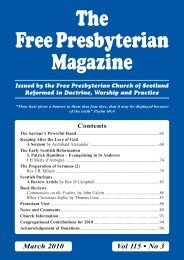December - the Free Presbyterian church of Scotland
December - the Free Presbyterian church of Scotland
December - the Free Presbyterian church of Scotland
- No tags were found...
Create successful ePaper yourself
Turn your PDF publications into a flip-book with our unique Google optimized e-Paper software.
366The <strong>Free</strong> <strong>Presbyterian</strong> MagazineThe Reformers urged <strong>the</strong> importance <strong>of</strong> <strong>the</strong> exercise for <strong>the</strong> Church <strong>of</strong>God in <strong>Scotland</strong>, though with certain cautions against doctrinal error, overcuriosity,and <strong>the</strong> use <strong>of</strong> invective in <strong>the</strong> free discussion. 12 This weeklymeeting <strong>of</strong> all <strong>the</strong> ministers in an area became <strong>the</strong> basis <strong>of</strong> <strong>the</strong> meetings <strong>of</strong>presbytery. The First Book <strong>of</strong> Discipline recognised four classes <strong>of</strong> ordinaryand permanent <strong>of</strong>fice holders: <strong>the</strong> pastor, <strong>the</strong> doctor or teacher, <strong>the</strong> elder and<strong>the</strong> deacon. Two o<strong>the</strong>r <strong>of</strong>fices, that <strong>of</strong> superintendent and reader, were created,having in view <strong>the</strong> scarcity <strong>of</strong> ministers and <strong>the</strong> needs <strong>of</strong> <strong>the</strong> times; <strong>the</strong>y werenot expected to continue when <strong>the</strong> situation became more settled. 13Ano<strong>the</strong>r important book, The Book <strong>of</strong> Common Order, was written byKnox and was an extension <strong>of</strong> a book <strong>of</strong> common order he had written, withhelp from Calvin, for <strong>the</strong> English Church he had pastored in Geneva. It wasa guide to ministers in performing <strong>the</strong>ir functions and bound up with it were<strong>the</strong> Lord’s Prayer, <strong>the</strong> Psalms and <strong>the</strong> Apostles Creed. It was used by readersto conduct worship in <strong>the</strong> absence <strong>of</strong> a minister. It was published in 1662 inEdinburgh and confirmed by <strong>the</strong> General Assembly in <strong>December</strong> <strong>of</strong> that yearas “a uniform order to be kept”.Reflections on a Life in <strong>the</strong> Ministry 1David Blackresbytery trials. Thursday, 19 [February 1784], was appointed for myPexamination before <strong>the</strong> Presbytery. It passed without censure, so that indue time, if <strong>the</strong> Lord spare me, my trials will go on. In <strong>the</strong> several steps <strong>of</strong>this affair, I acknowledge and adore <strong>the</strong> hand <strong>of</strong> providence. How little wouldit signify to me to have <strong>the</strong> favour and approbation <strong>of</strong> my fellow creatures,if I thought I did not have <strong>the</strong> call <strong>of</strong> God Himself to undertake this greatwork. Men may mistake our qualifications. They cannot penetrate into <strong>the</strong>secret purposes and dispositions <strong>of</strong> <strong>the</strong> heart, but all things are naked andopen unto <strong>the</strong> eyes <strong>of</strong> Him with whom we have to do. He knows whe<strong>the</strong>r ouraim is single or not – whe<strong>the</strong>r it is a sincere desire <strong>of</strong> being useful, an ardentlove to Christ, and a generous compassion for <strong>the</strong> souls <strong>of</strong> men that are ourchief motives, or whe<strong>the</strong>r our minds are influenced by <strong>the</strong> mean desire <strong>of</strong>worldly payment, ease or honour.12 See J J Murray, The Reformation 1560, p 43.13 Thomas M‘Crie, The Story <strong>of</strong> <strong>the</strong> Scottish Church, <strong>Free</strong> <strong>Presbyterian</strong> Publications 1988reprint, p 48.1 Taken, with editing, from <strong>the</strong> “Account <strong>of</strong> <strong>the</strong> Author” prefixed to Black’s Sermons onImportant Subjects. Black (1762-1806) was minister <strong>of</strong> Lady Yester’s <strong>church</strong> in Edinburgh.A sermon <strong>of</strong> his appeared in this Magazine last April.
















